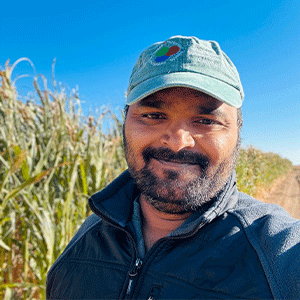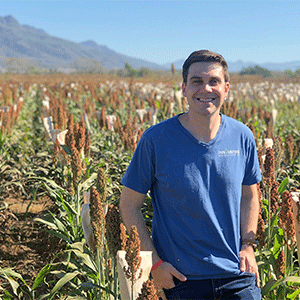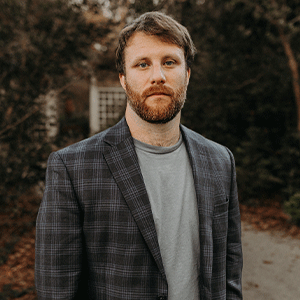
Swipe For More >
New Vanguard of Sorghum Breeders Shaping Industry’s Future
From the Sorghum Belt to the East Coast, sorghum seed companies are welcoming new breeders. Inspired by the legendary agronomists who came before them, this new vanguard has high hopes for the future of the sorghum industry.
The sorghum industry is welcoming a new vanguard of sorghum breeders. Each brings a unique set of skills and experiences to advance sorghum research and development in both the public and private sectors. Their collective efforts are geared toward leveraging sorghum’s genetic diversity to address challenges in sustainability, adaptability and crop improvement. Below, we get to know a few of many entering the field.
Raghu Sripathi
 Raghu Sripathi is the Research Director and Senior Plant Breeder for Warner Seeds, Inc., a position he has held since October 2023. Sripathi’s passion for sorghum is fueled by the crop’s resilience and potential for sustainability. He has a Ph.D. in plant breeding and genetics from the University of Wisconsin-Madison and a master’s degree in plant and soil sciences from Oklahoma State University.
Raghu Sripathi is the Research Director and Senior Plant Breeder for Warner Seeds, Inc., a position he has held since October 2023. Sripathi’s passion for sorghum is fueled by the crop’s resilience and potential for sustainability. He has a Ph.D. in plant breeding and genetics from the University of Wisconsin-Madison and a master’s degree in plant and soil sciences from Oklahoma State University.
Sripathi’s research, based in Hereford, Texas, is driven by efforts to develop new grain and forage sorghum lines and hybrids tailored for the U.S. and Mexico markets. But why sorghum? According to Sripathi, “sorghum offers an incredible genetic diversity with a wide range of end uses.” He is particularly drawn to the crop’s adaptability in water-limited environments, a critical attribute as regions battle aquifer depletion and unpredictable weather patterns. Despite sorghum’s lag in new traits and technologies compared to mainstream crops like corn and wheat, Sripathi sees a bright future, citing its “excellent water-use efficiency” as a cornerstone for its potential rise.
The influence of Michael D. Casler, Ph.D., Sripathi’s doctoral adviser, has played a large role in his career. Under Casler’s mentorship, Sripathi embraced the philosophy that “failure is not an option,” a mindset that has guided his meticulous approach to plant breeding.
Looking forward, Sripathi is optimistic about sorghum’s prospects. He envisions a resurgence in sorghum acreage, driven by advancements in genetic gain, doubled haploid technology, precision phenotyping and crop management technologies.
“My goal is to make better hybrids that serve grower needs with new traits and technologies,” he said. From his perspective, sorghum is poised for a significant leap, potentially expanding to a 10-million-acre staple crop. Sripathi’s journey is a blend of scientific rigor and a deep belief in sorghum’s role in sustainable agriculture, marking him as a pivotal figure in sorghum research and development.
Brian Pfeiffer
 Brian Pfeiffer, located in Bishop, Texas, serves as Sorghum Breeder at Innovative Seed Solutions. Pfeiffer’s research program is primarily aimed at developing improved sorghum lines and hybrids tailored for the Texas region. Since joining Innovative in 2017, after earning his Ph.D. in plant breeding at Texas A&M University, Pfeiffer has been on a mission to ensure sorghum remains a profitable and sustainable option for farmers. His work focuses on enhancing yield, standability, drought tolerance and sorghum aphid tolerance.
Brian Pfeiffer, located in Bishop, Texas, serves as Sorghum Breeder at Innovative Seed Solutions. Pfeiffer’s research program is primarily aimed at developing improved sorghum lines and hybrids tailored for the Texas region. Since joining Innovative in 2017, after earning his Ph.D. in plant breeding at Texas A&M University, Pfeiffer has been on a mission to ensure sorghum remains a profitable and sustainable option for farmers. His work focuses on enhancing yield, standability, drought tolerance and sorghum aphid tolerance.
“The plant’s ability to thrive in challenging environments fascinates me,” Pfeiffer said, appreciating both the crop’s toughness and its visual beauty during the grain color transition phase. These characteristics make sorghum breeding a particularly rewarding part of his job.
Mentorship has played a significant role in Pfeiffer’s career. He cites Bill Rooney, Ph.D., of Texas A&M University for teaching him the essence of being a scientist and managing a breeding program with humility and kindness. Michael Lenz, a seasoned sorghum breeder at Innovative Seed Solutions, also greatly influenced Pfeiffer, sharing invaluable knowledge and guiding him in the early stages of his career. These mentors have instilled in him a deep appreciation for traditional breeding methods and the irreplaceable value of field evaluation.
Looking ahead, Pfeiffer is excited about discovering new traits in sorghum, such as tolerance to Iron Deficiency Chlorosis (IDC), and integrating these traits into new hybrids. With the challenges of a warming and drying planet, he is optimistic about sorghum’s future. “As our planet gets hotter and drier, I believe more people will recognize sorghum’s unparalleled resilience on tough acres,” he said, foreseeing a growing adoption of sorghum by farmers drawn to its sustainability and resilience.
Zach Brenton
 Zach Brenton, as the Chief Technology Officer of Carolina Seed Systems, plays a pivotal role in advancing sorghum agriculture in the southeastern U.S. Co-founding the company in 2018, his leadership in new product development is guided by a singular vision: ensuring that by the season’s end, their growers are the most profitable.
Zach Brenton, as the Chief Technology Officer of Carolina Seed Systems, plays a pivotal role in advancing sorghum agriculture in the southeastern U.S. Co-founding the company in 2018, his leadership in new product development is guided by a singular vision: ensuring that by the season’s end, their growers are the most profitable.
Brenton’s academic foundation, a Ph.D. from Clemson University in genetics and biochemistry, set the stage for his career. His studies, intertwined with initiatives with the Sorghum Checkoff and the Department of Energy, aimed to bolster sorghum utilization on the East Coast.
Sorghum’s resilience and genetic diversity captured Brenton’s attention, drawing him to the crop’s potential. “I guess I like the underdog,” he said, highlighting sorghum’s ability to thrive in the East Coast’s marginal lands. “I like how sorghum can take a beating and still yield and drive profitability for farms and their families,” he added.
Mentorship has significantly shaped Brenton’s career. He credits Steve Kresovich, Ph.D., more of a geneticist than a traditional breeder, he said, for laying the foundational knowledge of public genomic resources that Carolina Seed Systems leverages today. Kresovich’s influence, alongside introductions to sorghum industry legends like the late Bruce Maunder, Ph.D., and Fred Miller, Ph.D., underscored the importance of building upon previous work to address contemporary agricultural challenges and prepare for future opportunities.
Looking forward, Brenton’s anticipation centers on the development of the next sorghum hybrid. This focus is emblematic of his broader approach: a continuous drive for innovation and improvement in sorghum breeding. Brenton’s work at Carolina Seed Systems is not just about the immediate benefits but also about contributing to a sustainable and profitable future for agriculture on the East Coast. Through his leadership and vision, Brenton is steering sorghum breeding into new territories, underpinned by a deep respect for the crop’s untapped potential and a commitment to the farming communities it serves.
Richard Boyles
 Since 2017, Rick Boyles has led cereal grains breeding and genetics at Clemson University’s Pee Dee Research and Education Center. As an assistant professor of plant breeding, Boyles’ work encompasses not just sorghum but also pivotal winter grains such as wheat and oats. His research program’s objectives are threefold: developing superior crop varieties and hybrids, broadening genetic diversity in breeding populations and identifying pivotal genes and alleles to enhance cereal crop resilience.
Since 2017, Rick Boyles has led cereal grains breeding and genetics at Clemson University’s Pee Dee Research and Education Center. As an assistant professor of plant breeding, Boyles’ work encompasses not just sorghum but also pivotal winter grains such as wheat and oats. His research program’s objectives are threefold: developing superior crop varieties and hybrids, broadening genetic diversity in breeding populations and identifying pivotal genes and alleles to enhance cereal crop resilience.
Boyles’ dedication to sorghum is rooted in his doctoral research at Clemson, under the guidance of the Coker Endowed Chair of Genetics, Steve Kresovich, Ph.D. His work on sorghum grain yield and quality sought to uncover genetics capable of boosting productivity and nutritional value.
The vast genetic diversity within sorghum, coupled with its versatility, sustainability, and hardiness, fuels Boyles’ optimism for the crop’s future. “The genetic diversity that exists in this crop species is so expansive, yet most of the global diversity has not been utilized for crop improvement,” Boyles noted, underscoring the untapped potential that sorghum holds.
Mentorship has played a crucial role in shaping Boyles’ career. Kresovich, not just a former graduate advisor but also a current collaborator, has been a significant influence, alongside memorable interactions with leading U.S. sorghum breeders like the late Bruce Maunder, Ph.D., Fred Miller, Ph.D., Cleve Franks, Ph.D., and Bill Rooney, Ph.D. These discussions and collaborations deeply inspired Boyles to continue his work in sorghum breeding.
Looking ahead, Boyles sees a bright future for sorghum. With its considerable genetic diversity yet to be fully leveraged, he believes there are vast opportunities for significant advances in the crop. “At a time when crop resiliency is paramount for national and global food security, I am confident sorghum has a rather large seat at the table,” Boyles said.
###
This story originally appeared in the Spring 2024 Issue of Sorghum Grower magazine.


